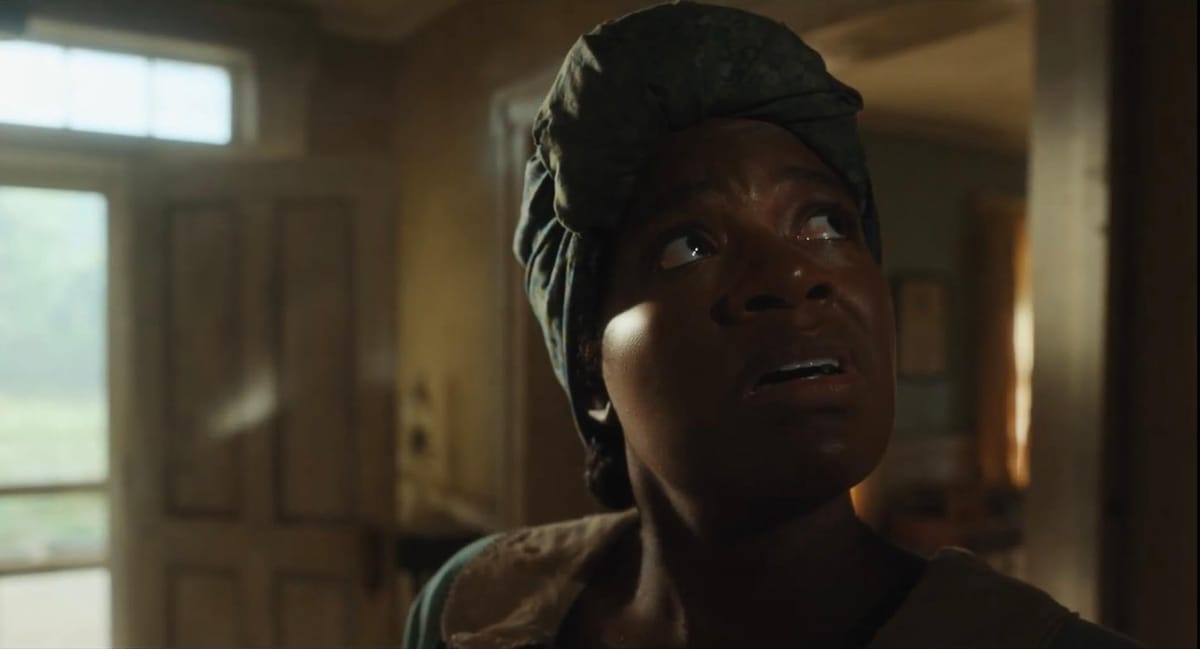The Color Purple
A musical version of the classic story.

Yet another popular, arguably important piece of literature which somehow passed me by: I’ve neither read the book nor seen the Spielberg movie. I can’t even point to my general dislike of “classic” literature (whatever that means), as it came out in the 1980s, far more recent than most of those books I found so boring and overwritten in school. So I was glad to finally see a version of the story, albeit one a few generations removed, as this is based on the musical, which is in turn based on the book.
As the movie opens, Celie (Phylicia Pearl Mpasi, then Fantasia Barrino), who can’t be more than 15, gives birth. Her father Alfonso (Deon Cole) takes the baby away, claiming ownership over it, presumably intending to kill it. Soon after, he marries Celie off to Mister (Colman Domingo), a farmer and widower who lives outside of town, separating her from her sister Nettie (Halle Bailey, then Ciara) for the first time. Immediately, he sets her to taking care of his children and house, verbally and physically abusing her when she doesn’t do things exactly the way he expects. He forbids her from having visitors or leaving the house, effectively imprisoning her. Nettie comes to stay with them for a bit, implied to be escaping Alfonso’s abuse, but gets thrown out by Mister after she fights off his own attempts to rape her. Celie and Nettie lose touch, as although Nettie writes weekly, Mister makes sure to intercept every single one.
From this vantage point, we experience nearly forty years of Celie’s life. She meets many remarkable people at the jukebox on Mister’s land, built by his son Harpo (Corey Hawkins), a man who tries very hard to be as much of a bastard as his father but can’t quite pull it off. First is the incredibly strong-willed and sure of herself Sofia (Danielle Brooks), Harpo’s ex-wife, who tries to impress upon Celie that she should never accept a hand raised against her. And most consequentially is singer Shug Avery (Taraji P. Henson), who also happens to be Mister’s lover from a past life.
This is a tricky movie to summarize sans spoilers, as there’s not a traditional plot, per se. More, it’s a snapshot of Celie’s life at different points, all of which add up to the place we find her in by the climax and denouement. There are people who stay in her life in one way or another, people who influence her and who help her through some truly dark times, and some common threads between them. But the change across the story is more of a slow, subtle build that comes to a head all of a sudden in a very well-done and tense scene. Until that point, we’re surveying the land, and getting a sense of what life was like, mostly for Celie but also for Black people in Georgia in the first half of the 20th century.
Each time period serves as its own mini-arc, most of which I found pretty unsatisfying. No matter how strong the influence in her life that time around, or how much Celie seems taken with them, little seems to change. It’s hard to not get frustrated with her stagnation. Sure, she’s not exactly in a position with much power or agency, so it’s understandable. But it ends up making things feel quite inert.
Most of the songs are pretty good, with a few killer standouts such as “She Be Mine” and the brief “Workin’”, and only a few forgettable, generic ones. And the singing is all excellent. But much of the accompanying choreography feels like it’s directly taken from Broadway, which for some reason really took me out of the film. I think it’s because while the flashiness of the moves and the synchronicity of the dancers impresses me live, the power of editing dampens that enjoyment and instead renders it distracting.
Overall, this just made little impression on me. The story isn’t particularly noteworthy, and the musical of it all served to distance me from the characters, as it always does. All of it is solid, but none of it is compelling. Not to mention that the early attempts to setup the end of the movie are so obvious that they remove a bunch of tension from the middle. And the movie’s insistence on treating them as reveals when they do come elicit eye rolls rather than emotion. Maybe there’s something special this is doing in comparison to the original 1985 film, but on its own, it’s passable at best.